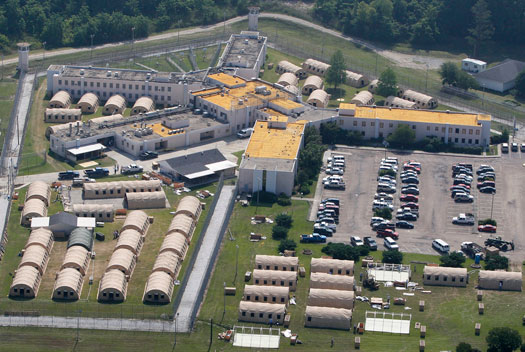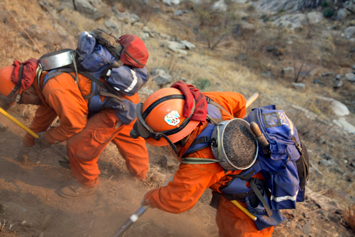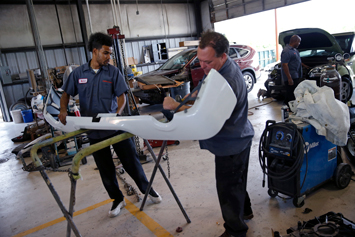Angola Prison plaintiffs in federal lawsuit alleging medical neglect await verdict
By Barrington M. Salmon -Contributing Writer- | Last updated: Nov 9, 2018 - 9:14:08 PMWhat's your opinion on this article?

This May 9, 2011 fi le photo, shows the Louisiana State Penitentiary at Angola in West Feliciana Parish, La. U.S. District Judge Brian Jackson expressed frustration as he questioned
why prison offi cials won’t spend roughly $1 million to install air conditioning on death row, since the state has already spent much more to fi ght this in court. Photo: AP/Wide World Photos
|
The Angola State Prison has earned the reputation of being the most notorious prison in Louisiana, which itself has the dubious distinction of being called the incarceration capital of the world.
The sprawling 18,000-acre prison complex called “The Farm” is bounded by the Mississippi River on three sides and located on land that was originally an 8,000-acre slave plantation in West Feliciana Parish, a remote region of Louisiana almost 200 miles from New Orleans.
The prison—the largest maximum-security institution in the U.S.—houses about 6,400 men, 75 percent of them Black—and a staff of 1,800.
For years, those held behind bars have complained about the abysmal treatment of those seeking medical treatment by prison guards and staff. Because of who they are, and because of the deeply unbalanced power dynamic—these complaints were often ignored or not taken seriously. A day of reckoning could be on the horizon as a class-action lawsuit filed on behalf of 6,000 people recently was presented in court.
Lawyers for the plaintiffs said Angola State Prison is notorious for the brutality of its past and the cruelty of its present, as scores of men are subjected to unnecessary suffering, and even death.
The lawsuit said prison officials lack an appropriate program to identify and remediate the range of problems. This directly contributes to the pervasive risk of severe harm—and the frequent manifestation of actual harm—that the incarcerated men consistently experience. The lawsuit also said the officials have subjective knowledge of their policies and practices, their inadequacies and the risk of serious harm.
“There is no question that defendants know their own policies, practices, and procedures; and there is no dispute that they know about the many patients who pass away or suffer adverse events,” the lawsuit said. “… But even beyond the obvious and pervasive nature of the deficiencies proven by Plaintiffs, defendants have repeatedly been warned of and acknowledged the various structural and clinical deficiencies that place class members at risk, without taking reasonable steps to eliminate that risk.”
State and prison officials have been aware for more than 25 years that their policies and practices expose inmates to a risk that they will receive inadequate health care.
“External investigations in 1991 and 1994 reported unconstitutional failures in the system, including most if not all of the problems that Plaintiffs have proven today: failure to properly assess, diagnose, or treat medical problems; unacceptable delays in treatment; inadequate staffing, both in number and training; and failure to follow-up or properly refer patients for further treatment,” the lawsuit added.
These findings were supplemented by later external reviews of Angola in 2009, by medical peer reviewers in 2012 and 2014, and by numerous warnings from individual medical personnel. Dr. Raman Singh, then the statewide medical director, observed in 2009 that the Department of Corrections was “already operating with bare minimum staff” and not adding employees could “lead to compromised health care delivery. …”
Officials cited budget cuts and austerity measures as the primary reason why the state has been unable to fulfill its “constitutional obligation to provide optimal health care to inmate population.”

Female prisoners working in a remote mountainous area of the Witch Fire past Santa Ysabel, California. Observers say prisoners perform in life threatening jobs with little or no medical or monetary compensation. Photos: Youtube
|
The 137-page lawsuit is a modern-day horror show of the system’s barbarity and the neglect and inhumane treatment visited on the men incarcerated at Angola. They include a man who suffered a stroke but was denied medical attention four different times, leaving him blind and paralyzed; another man who was denied access to a specialist for four years while his throat cancer advanced; and a blind man who was denied a cane for 16 years. Several of the plaintiffs have died since the case was filed, due in significant part to unconstitutional care.
Shannon Hurd is an example. He was serving a life sentence for stealing $14 after breaking into a house. He submitted sick call requests for years as he began losing weight—almost 100 pounds—and experiencing flu-like symptoms. His symptoms worsened, and he developed a pain in his side but doctors repeatedly dismissed his medical complaints. He wasn’t tested until late 2015, at which time his cancer had metastasized with tumors spreading to his brain and other parts of his body. He died in 2017 at the age of 42.

Prisoners learn auto mechanics at Angola prison. Proponents say inmates learn life skills while incarcerated, but many say the lack of medical benefits and fair wages put the inmates at a high risk to injury and job-related illness.
|
In another case, Alton Adams, another plaintiff who suffers from artery disease, began having problems with his right leg after arriving at Angola. He was told that he needed a stent to address his circulation problem. Instead, he developed a blood clot that led to the amputation of his right leg below the knee. Since then, he has had two more amputations that have brought his leg down to the mid-thigh. He is now having problems that could lead to an amputation of his left leg, too. A visiting doctor from New Orleans said he could not believe that Angola staff had missed the obvious infection that led to the amputations, which could have been avoided.
Prison officials used the men for the Angola Rodeo—the longest running prison rodeo in the U.S. —and several of them suffered a variety of injuries, including being kicked, thrown, trampled and suffering broken bones. Those who need medical attention must pay a $3 co-pay for sick calls and $6 for emergency calls which according to a special report by In These Times, netted the prison more than $192,000 over three years.
The men held at Angola make as little as four cents an hour for grueling fieldwork, meaning it could take 150 hours to pay off a single $6 co-pay for an emergency assessment. And while the prison is constitutionally obligated to care for patients who can’t afford the co-pay, that debt doesn’t disappear, the report’s authors said. “The bills stack up,” said Francis Brauner, a former inmate. “If you ever do get money, they take all that money to pay toward your medical bill. And if you don’t, and you leave prison, it follows you.”
All these and other complaints led to a group of incarcerated individuals filing a federal lawsuit seeking redress from the courts.
The case went to trial on October 9, ended a little more than three weeks later and both sides are awaiting the judge’s verdict. The lawsuit, which was filed against the Louisiana Department of Public Safety and Corrections in May 2015, describes the medical care provided at the Louisiana State Penitentiary—also known as Angola—as fundamentally and grossly deficient, and far below constitutional and statutory requirements. The inadequate health care at Angola has contributed to the fact that Louisiana has the highest rate of prison deaths per capita in the country, the lawyers and plaintiff said.
A federal judge certified the class action on behalf of all the men incarcerated at Angola in February. The outcome of the case will affect the lives of at least 6,000 people at the prison, said Mercedes Montagnes and Brian Hamilton.
“After decades of neglect and ignored complaints, the people incarcerated at Angola were left with no choice but to seek the help of the courts,” said Ms. Montagnes, executive director of the Promise of Justice Initiative and lead counsel on the case. “People are suffering. People are dying. It is our sincerest hope that this suit will ensure that the state of Louisiana treats all its people with basic decency and in accordance with the Constitution. The only thing the patients at Angola are seeking in this suit is access to basic healthcare, which they can receive in no other way than through the state.”
“People don’t stop being human once the cell door closes behind them. Louisiana must do better; its citizens expect and deserve a government that upholds fundamental human rights,” said Mr. Hamilton, staff attorney for ACLU of Louisiana. “No judge would ever sentence someone to slow torture by an untreated medical condition, but, in effect, that is what is happening every single day in Louisiana. This legal action is the only way to fix this glaring failure.”
The plaintiffs are represented by The Promise of Justice Initiative, the ACLU of Louisiana, Advocacy Center, the Southern Poverty Law Center (SPLC), the law firm Cohen, Milstein, Sellers & Toll and attorney Jeffrey Dubner.
As the lawsuit details, Angola has a documented history of substandard medical care. In the 1990s, prompted by a class action lawsuit, the Department of Justice conducted an investigation and reported to the court that Angola “fails to recognize, diagnose, treat or monitor the serious medical needs of inmates.” The prison and plaintiffs reached an agreement in 1998 that put Angola under a temporary federal monitor.
The current lawsuit points out that many of the medical practices described by the plaintiffs echo those condemned by the Department of Justice 25 years ago, including delays in care, under qualified staff and a “malingering” rule that effectively punishes people for requesting medical assistance.
Frank Brauner was at Angola, serving time for a rape he has always insisted he was wrongfully charged. In several interviews, he spoke of suffering a back injury that left him paralyzed. Despite not being mobile, he was classified as dangerous and put in a bed in solitary confinement, without access to a wheelchair. Bedsores caused an infection which poisoned his lower body and it soon affected his heart and blood and he ended up having emergency surgery. Brauner told In These Times reporters that the surgery saved his life but left deep, gaping wounds that failed to heal. He spent the next 10 years fighting the prison for medical care.
“I started seeing that they don’t treat nobody,” he said. “You get hurt, you get sick, or you can’t produce for them no more in their fields or in the hobby shop. … They put you on a ward, on a bed and let you die.”
Cancer patients were treated no differently.
“They keep complaining about the same thing [but] the EMTs will just say, ‘Well you got a stomach virus, give him Pepto-Bismol, just give him something and get him out of here.’ If you go there too much, they’ll write you up for malingering. So then all of a sudden they decide to finally send him out, well, he’s already got Stage 3 cancer. Because they procrastinated and procrastinated, this guy’s dying.”
Those behind bars at Angola die at extremely high rates. In 2015, there were 58 deaths—more than one a week. That mortality rate—923 deaths per 100,000 prisoners—dwarfs the nationwide average in state prisons, which was 274 deaths per 100,000 in 2013 (the most recent year data was available), said Ridgeway and Quandt.
One factor is the large proportion of Angola’s prisoners serving life sentences—more than 65 percent—thanks to Louisiana’s draconian sentencing laws. … Twenty-five percent of Angola’s prisoners are 55 or older, compared to just 10 percent in state and federal prisons nationwide.
But it’s not just old men who are dying, they said. Last year, mortality rates at Angola were higher than the 2013 national averages for prisoners in every single age group over 25.
“These abysmal conditions have been especially harmful to people with disabilities, who have been systematically denied access to even the most basic accommodations as required by law,” said Jeffrey Dubner, co-lead counsel on the case. “We’re asking the court to order prison officials to stop endangering people’s lives and start fulfilling their obligation to provide adequate medical care and disability accommodations to the people at Angola.”
INSIDE STORIES AND REVIEWS
-
-
About Harriett ... and the Negro Hollywood Road Show
By Rabiah Muhammad, Guest Columnist » Full Story -
Skepticism greets Jay-Z, NFL talk of inspiring change
By Bryan 18X Crawford and Richard B. Muhammad The Final Call Newspaper @TheFinalCall » Full Story -
The painful problem of Black girls and suicide
By Charlene Muhammad -National Correspondent- » Full Story -
Exploitation of Innocence - Report: Perceptions, policies hurting Black girls
By Charlene Muhammad -National Correspondent- » Full Story -
Big Ballin: Big ideas fuel a father’s Big Baller Brand and brash business sense
By Bryan Crawford -Contributing Writer- » Full Story






 Click Here Stay Connected!
Click Here Stay Connected!








